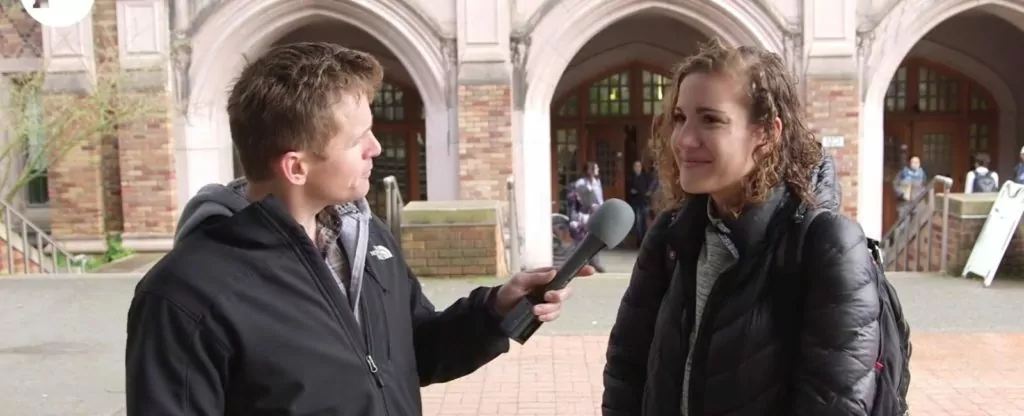A one-question test
During an episode of the TV drama West Wing, the President of the United States has to figure out whether a boatload of Chinese refugees are really Christian. If they are, they’ll get to stay in the US, since they would be true refugees from China’s persecution of Christians. However, they might only be claiming to be Christian so that they will be able to stay in the US. The President has to figure it out so he summons one of the refugees to the White House, and asks him a simple question.
“Can you name any of Jesus’ disciples?”
He didn’t ask him a theological or doctrinal question, but instead tested the man’s Bible knowledge. If the man was really a Christian he was expected to know basic well-known parts of his Bible. It was not an unreasonable expectation, and on the television show the Chinese refugee passed the test with flying colors, naming all twelve. But would we do as well? Do you know your Bible well enough to name all twelve disciples? Quiz your family – answers can be found at the bottom of this article.
Did you hear the one…?
Did you hear the one about the three-legged dog who walked into a saloon? He sidled up to the bar, pulled out his gun and fired a shot in the air to get everyone’s attention. Then he barked, “I’m looking for the man who shot my paw!”
Did you hear the one about the bear who rumbled into a saloon and said, “I’d like a grilled………….. cheese.”
The bartender asked, “Why the big pause?”
“I’m a bear.”
Did you hear the one about the world’s worst thesaurus? Not only is it terrible, it’s terrible.
Don’t make big out of little
While the Bible never names the “principle of proportionality,” it does presume it, teaching us not to treat small things as big, or big things as small. In Matt. 7:3-5 Jesus teaches us not to correct a small fault in others, even as we overlook our own big sins. Then in Matt. 23:23, the Pharisees are taking to task for tithing mint, but neglecting the love of God.
Today our society also treats as unimportant what is big (God, the plight of the unborn, the sanctity of marriage, etc.) and treats the small as big, Osychologist Jonathan Shelder detailed some examples in a series of tweets:
“What psychologist [Albert] Ellis called ‘awfulizing’ and ‘horriblizing’ has become a culturally-accepted to speak and think
It wasn’t upsetting, it was trauma
I wasn’t annoyed, I was harmed
They’re not difficult, they’re toxic
I wasn’t uncomfortable, I was unsafe
It wasn’t disagreement, it was gaslighting
It wasn’t words, it was violence
“In this way, we transforms life’s unavoidable difficulties into the Most Important Thing in the Universe And ourselves into the Main Character in the Universe.”
This sort of narcissism ignores that there are truly horrible and awful happenings in the world. Every time little is made out to be big, it makes it more likely that the truly wicked will be ignored. So Christians mustn’t be like the boy who cried wolf.
Screen-fasts seem to be trending!
A CRC publication called Christian Courier asked readers to go on a screen-fast, and in the May 5 issue, editor Angela Reitsma Bick reported on the results. Her volunteers went one to three days without their phones. That’s not a lot of time, but they still learned some lessons.
One gentleman, Dan DeBruyne, a physiotherapist, went just one day, and was anxious about all the unanswered texts he assumed must be piling up. At day’s end he realized, yes, there were 16, but only a couple were actually important. He shared, “It was an exercise in humility. To think I am required to be reachable 16-18 hours a day has an air of pride about it.” He also noticed that setting his phone aside, even for that one day, allowed him “quiet moments of daydreaming.” He was able to be “fully engaged playing with my daughters and making more eye contact during conversations.” His brief digital detox also allowed him to “realize how frequently I look to my phone to fill silence. How frequently I try to drown out any ‘still small voices’ with newsfeeds, friends’ photos or memes.”
So how about? Are you up for RP’s own social media screen-fast? See the details here.
Democracy from the comfort of your home?
Mail-in ballots and e-voting are supposed to be the very latest improvements to the democratic process. The touted benefits are that it should increase voter participation by making voting quicker and easier.
But do we really want to make voting any easier than it already is? As it stands now, we have to vote once each for the federal and provincial governments every four years or so. That works out to an average of once every two years. Traditional elections require us to leave the house and walk or drive to the nearest poll. If you’re a city voter the whole process will take about half an hour, and if you live in the country it may take up to an hour (or two if it’s snowing). That works out to an average of 15 – 60 minutes of voting time per year.
And still, only about half the country is willing to spend the time to go out and vote. Electronic voting promises to make the process less time consuming, down to an average of around 2 minutes per year, and it consequently promises to increase voter turnouts. The downside is that the increase in voters will be made up of people who only started voting when it would take less than 15 minutes of their time! Per year!
Instead of making voting easier, we should make the whole process a good deal tougher. Next election we should tell all the voters in Edmonton that their polling stations are in Calgary, and vice versa. A 700-km round trip, once every couple of years. Now that’s something that could improve the democratic process!
Grandpa…?
A little boy asked his grandfather if he had been on the ark with Noah. The grandfather chuckled a little and told his grandson that no, he had not been on the ark.
The confused grandson asked, “Then why didn’t you drown Grandpa?”
Democracy and polygamy don’t mix
Some years back, political scientist Tom Flanagan pointed out how polygamous marriage may be more harmful than homosexual “marriage”… at least for democracy. In his National Post article, “Democracy, polygamy, and the sexual constitution,” Flanagan argues that polygamy is detrimental to constitutional democracy. Democracies throughout the Western world are all monogamous, and constitutional democracy was only adopted in non-Western societies like Japan and India, when they too, accepted monogamy as the norm.
Flanagan doesn’t believe monogamy causes democracy – there are monogamous societies like China that are dictatorships. But he does believe that widespread polygamy is detrimental to democracy. Areas where polygamy is popular like the Sub Saharan Africa, or parts of the Middle East are also areas where constitutional democracy has made the least progress.
But why?
Three reasons. First, polygamy almost always involves one (usually rich) man with multiple wives, which leaves many men with no chance of marriage, since there are fewer available women. Without the responsibilities of having to provide for a family, men are more inclined to crime. Studies in the US have found that crime is higher in areas where men won’t marry the mothers of their children and won’t, consequently, take on family responsibilities. A surplus of aimless, frustrated males also seems to make wars more likely, and generally creates instability, which is detrimental to democracy. Finally, as more men are left without wives, women become valuable as commodities. They are used as bartering chips to seal alliances and are treated as little more than property. And pieces of property don’t usually get to vote.
Flanagan concludes that if we want to preserve democracy, the state must take a stand against polygamy.
Making it work
In the West, many pick partners based on qualities that may disappear over time: looks fade, intellect dulls, and charm may become cloying. The very qualities that made us fall in love initially, when gone, may have us thinking we’ve fallen out of love.
The arranged marriages common in Asia and Africa aren’t based on attractive attributes or qualities. Instead of spending time wondering who they should marry, these couples are forced to figure out, given the person they are married to, how they will make it work. So they know right from the start that marriage is something you have to put effort into, and that love is something that can be built up.
I’d never want an arranged marriage, but the West would benefit if they understood better that a good marriage takes work.
Quotables
“The only thing necessary for the triumph of evil is for good men to do nothing.” – commonly, but probably wrongly, attributed to Edmund Burke
“When you choose the lesser of two evils, always remember that it is still an evil.” – Max Lerner
Atheists are living in the wrong world
Every met a morally outraged atheist? What’s that about? That’s akin to… well, it’s akin to a flat earther taking a vacation trip round the world.
In the Spring/Summer 2025 issue of Barnabas magazine, Owen Pikkert told a story about a flat earther who wanted to go on an exciting holiday. When his travel agent pitched the idea of polar circumnavigation – crossing both the North and South Poles – he had objections: The trip was too long. It was too expensive. Parts of the trip would be cold.
His travel agent could have tried to solve these objections, perhaps by finding a discount rate, or providing blankets.
“Or she could observe that the flat-earther is living in the wrong kind of world. For his objections presuppose that the world is spherical. In other words, he is borrowing from the spherical world in order to critique some aspect of the spherical world. Surely he should not raise such objections. Or, better yet, surely he should give up on a flat earth.”
Debate can be a powerful way to discover the truth; so notes Prov. 18:17. But debate can also be a tool of obfuscation (as can the use of big words) by bringing up what’s irrelevant to hide what’s important. Parents experience this downside when a teen caught out past curfew starts asking why his brother gets away with so much more than he does. His parents shouldn’t go there, should they?
When an atheist starts attacking God we shouldn’t go there either. Instead we need to demand the atheist explain on what basis he’s condemning anything or anyone at all. The purposeless pitiless universe his worldview proclaims doesn’t have wrong or right – it doesn’t care. So he needs to either live out his worldview and stop complaining, or admit to atheism’s shortcomings and reject it. But in the meantime we shouldn’t treat his moral objections seriously – it’ll only make him think he has a point (Prov. 26:4-5).
Answers
What are the names of the twelve disciples?
Simon Peter, Andrew, James (the son of Zebedee), John, Phillip, Bartholomew, Thomas, Matthew, James (the son of Alphaeus), Thaddeus (Lebbaeus), Simon, and Judas.












